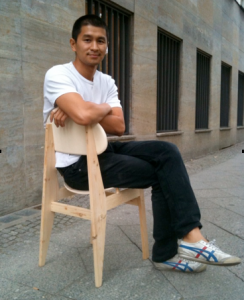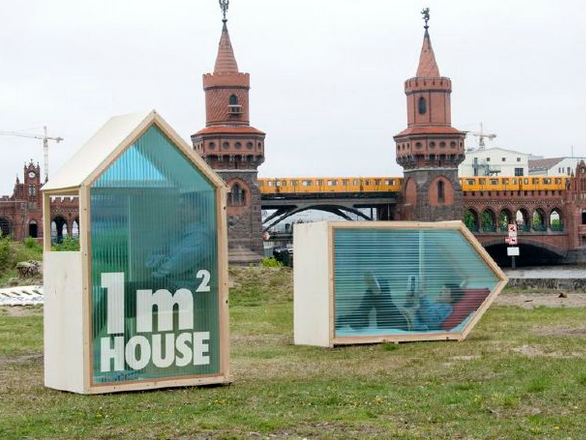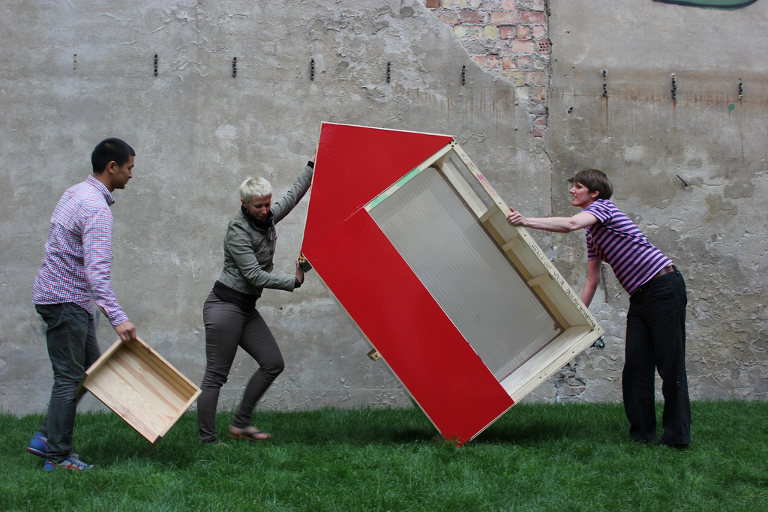Silke Helfrich interviews architect Van Bo Le-Mentzel: Van Bo Le-Mentzel has invented all kinds of useful things, among others, do-it-yourself blueprints for furniture and tiny houses. He has become known for social DIY projects such as “Hartz IV1 Möbel,” the Unreal Estate House,2 and the One-Square-Meter House.3 He is now transferring the concept of these projects – unconditional freedom to use something for one’s own purposes – to his own life and that of his family with a campaign called #dScholarship that he started in 2014.

Credit: Paradis Sauvage / Stephanie Bothor
“There’s a genius in every one of us. Wake it up!” Following an interview about #dScholarship, with which the architect, always in a good mood, would like to have “the crowd” finance a whole year of his work, a journalist said, “In a way, the campaign is looking for patrons in a world in which counts and feudal lords no longer exist and people are not under the patronage of others. The Protestant, democratic version of indulgent permanent financial support. Or in Van Bo’s words: a first step toward an unconditional basic income.”4
And the exciting thing is: this basic income does not depend on the state or the anonymity of contributors, but on the recipient’s relationship to them. A commons-based basic income, as it were – one that decouples the goods and services rendered from those received in return. One that grants freedom and enables Van Bo Le-Mentzel to do “basic work.” What makes a young man with an infant in a baby sling place half his life in the hands of a community, after coming up with Open Design, a fair-trade shoe project (Kharma Chacks), and after many other stages of his work? Is that courageous or crazy?
Helfrich: Van Bo – a designer of designer furniture or “things that serve their purpose”?
Le-Mentzel: Designer furniture.
Helfrich: Sounds ambitious…and expensive. But you are an architect, and you have designed “Hartz IV Möbel.” Could you tell me more?
Le-Mentzel: They’re instructions for building furniture that is usually very expensive. I looked to the Bauhaus for inspiration, guided by the idea: every human being should be able to afford a “Bauhaus chair.”
Helfrich: How did you develop this idea?
Le-Mentzel: I often wonder what kind of furniture – or other things – would be created if one weren’t always asking the question about how they can be sold. I think that many goods would be different. They would be less harmful to the environment and to the workers producing them. And they wouldn’t make so many false promises to consumers. Good goods, as it were. (laughs)
Helfrich: Like “Hartz IV Möbel.”
Le-Mentzel: Exactly.
Helfrich: What is the role of the open design idea here? You point out that people are explicitly encouraged to imitate Hartz IV Möbel and the Karma Chakhs as well as the do-it-yourself house projects. Other creative professionals have a different perspective.
Le-Mentzel: I believe in open source and support the open design idea, but I have invented other terms for it – terms that presuppose openness without using the word.
Helfrich: For example?

Van Bo Le-Mentzel on his Kreuzberg 36 Chair
Le-Mentzel: Beta business. What I mean is quickly establishing something new using open source tools, or starting a business together with the crowd, without any aspirations for success: blogs, free platforms like strikingly5 or etherpads,6 or the campaign platform avaaz7 can help here.
Helfrich: That doesn’t necessarily mean that it benefits everybody.
Le-Mentzel: That’s right, but it presupposes openness, and that changes everything. It simply doesn’t make sense any more to have fixed structures, a logo, a business plan, corporate goals, patents, or mechanisms for monitoring success if you’re constantly in the beta phase. I’m not interested in being an alpha male in a beta business, either, because it’s about moving the idea forward, not about anyone’s sensitivities.
Helfrich: Is that merely theory or also practice?
Le-Mentzel: Betahaus – probably Germany’s best-known coworking space in Berlin – is very practical. The same is true of bookcrossing8 or Wikipedia, but also of Hartz IV Möbel. That’s more than just theory. The interesting thing, though, is: no competitors, no squabbling, no strict hierarchy, and – very importantly – no bureaucracy or administration. It’s completely open-ended. People who work like this have an entirely different attitude about things….
Helfrich:…and they have to do without being able to plan. That means insecurity, but also more space for coincidence.
Le-Mentzel: That’s another term I like to use: random design. Intentionally designing for coincidence, with the subtext that failure is desired, too. It isn’t about getting from A to B in the most direct way possible. Business plans are A-to-B systems, schools and universities are A-to-B systems. It isn’t even about B any more, but about C. About whatever emerges and that can’t be planned. Vespucci and Columbus finding the ocean route to America were A-to-C processes. The same is true of many inventions, for example, 3M’s sticky notes or Google Maps. They came into being more or less by chance during people’s free time. Industry doesn’t like random, because random can’t be scaled up and can’t grow. For instance, you can’t invent sticky notes twice. In particular, you can’t assign someone the task of inventing them. In a sense, it invents itself. That’s exactly why I love randomness!
Helfrich: Who owns Hartz IV Möbel and the Unreal Estate House? Or more generally: who owns what comes out of the open design process?
Le-Mentzel: In any case, it isn’t mine. I’m not convinced of the idea of “intellectual property.” Knowledge must be free: ideas, compositions, texts, tattoos, designs, colors, words, sculptures, jokes, blueprints, YouTube videos. Incidentally, my favorites are the TEDTalks by Sir Ken Robinson and Hans Rosling and videos that teach you how to build rocket stoves. When knowledge is free, the best for all emerges. Parallel to that, we have to create systems in which inventors, movers and shakers, musicians, and other knowledge creators – and not just superstars like Damien Hirst – can live in dignity.
Helfrich: Many creative professionals and designers use precisely the same argument – namely, being able to live a life of dignity – to defend the idea of intellectual property and copyright (which is based on it). They are supposed to protect creators from imitation.
Le-Mentzel: Yes, that’s an important point, at least in the current system that is oriented entirely toward competition and exploitation of ideas and knowledge. But who says that it has to be like that forever? What I fundamentally call into question is this: Let’s take Damien Hirst as an example, one of the most successful (and richest) contemporary artists. He makes millions by transforming a real shark into a work of art. I doubt he would have had the same effect with a duck or a Golden Retriever. I think that neither journalists nor poets nor composers could write or produce without being inspired by what they see out in the world, and without the support of others.
What do they pay those who inspire them? Or the sources that nourish them and on which their work is based? Do journalists pay the people they interview? Do photographers pay the objects they shoot – landscapes, skylines, buildings or people – by which they earn money? The bridges of Venice have inspired so many poets and composers. These bridges really need (financial) support. I don’t know any creative artists who would donate a part of their profits to repairing bridges.
In addition, the problem with the current systems [of intellectual property] is that they are all performance-oriented. They benefit some – usually well-known artists – but not others.
Helfrich: You’re raising the question of fairness.
Le-Mentzel: Yes, of course. The two of us are now conducting an interview for your book.
Helfrich: For our book. After all, a lot of people are involved in it.
Le-Mentzel: Which is almost always the case. Now one could ask: Who is actually working for whom? Who owns what is said here? Who has to bill whom? Do I bill you? Or do you bill me? Of course, one can try to deal with this in a contract. That would make the lawyers happy. But one can also try to promote the idea, in this case, the book’s success. And when it’s about that, I’m not concerned with the question about who owns this interview. It will be published under a Creative Commons license, which guarantees that others can use our ideas and develop them further. I think that’s a good idea, and that’s why I’m happy to make a contribution. Who knows what our readers will make out of it.
Erich Fromm [the German social psychologist and philosopher] even wrote that some mindful readers actually understand a book better than the author himself. From that perspective, preserving vested rights is extremely backward. Incidentally, I took that as encouragement to republish his classic book To Have or To Be with references to current affairs.
Helfrich: You also published Ayşe Langstrumpf, a Berlin-Kreuzberg version of Pippi Longstocking [in German: Pippi Langstrumpf], right in time for the seventieth birthday of the world’s most famous brat. In your version, Bloom and Thunder-Karlsson are gay, and the monkey Mr. Nilsson is called Mr. Nguyen. So that’s what emerges if you’re not interested in selling something – Ayşe Langstrumpf is not for sale. You simply publish instructions on the Internet how everyone can print their own version of Pippi, based on the original text.
Le-Mentzel: That’s exactly how I would publish the book by Erich Fromm. A summary of his life’s work. I’ll leave out copyrighted parts of the text and add links to the missing passages on the Internet. The book is completed only through interaction with the readers. To me, that has something symbolic. Economic activity begins with people working together. And that’s why it’s easy to outwit systems that are based solely on money and the notion of individual property. You only have to remove their foundation, and then they’re not worth anything at all.
Helfrich: Simple? That’s certainly arguable!
Le-Mentzel: You just have to take the price tag off of capitalism – copyright is one of its catalysts – and then trademark protection, copyright and commercial principles are irrelevant. Neither the Hartz IV Möbel nor the Karma Chakhs have price tags. You can’t buy them. If you want to have them, you have to make them yourself or manufacture them in a community. Another word for this is “prosumption.” Vitra, IKEA, Converse, or publishers’ classic strategies are powerless in countering prosumption.
Helfrich: And now you want to get rid of your own price tag?

The One-Square-Meter-House. Photo © by Daniela Gellner.
Le-Mentzel: Yes. That’s why I started my own #dScholarship campaign to secure my livelihood for a year. The basic idea is to decouple services from pay. Then I’m not forced to work for money, but can do meaningful things instead. I call that karma work.
I used to work freelance and charged 250 euros per day for illustrations. I have an exclusive contract with a design agency, and it charges its clients four to five times that amount. Everything in the world, not just goods, but also raw materials, people, time, even stellar constellations have been given a price tag. That drives us crazy. Of course, I have already thought about how it can be that other colleagues get twice as much or more for a service that I perform at least as well. The CEOs of Volkswagen and the Techniker Krankenkasse9 earn a lot more money than Chancellor Angela Merkel. Do these people achieve and work so much more?
Helfrich: Your pitch was for people you don’t know to practically give you 375 euros per week, or 1,500 euros per month. Why?
Le-Mentzel: Because that’s roughly what I need to live. To be honest, that’s the amount, roughly speaking, that my wife and I agreed on. Right now, my steady job pays a lot more than 1,500 euros. I promised her that I would do the #dScholarship project only if amounts to at least 1,500 euros a month. She already got a fright when I told her that I’d like to give up the privileges of having a steady job with permanent contract. Next year, I won’t be billing anyone. I will simply work, without money and without thinking about profit. I call it unconditional basic work.10
Helfrich: If everyone simply does what they feel like doing, who will do the dirty work?
Le-Mentzel: Hm, good question. Who’s doing the dirty work today? People who need money to survive are paid a small amount, and then they’ll do anything: cleaning toilets, digging for ore in mines, picking cotton, doing sex work. Women in India have recently begun working as surrogate mothers for Western career women. To me, that isn’t an alternative because these people aren’t doing these things voluntarily.
I’m curious to see whether I’ll perform unpleasant work next year voluntarily. It’s all a question of attitude. When we packed shoes for Karma Chakhs, I declared this tedious work an event: a packaging party with music and a buffet. In Seoul, people voluntarily cleaned the streets when the soccer World Cup public viewing events were over. It was a huge happening. Cultural work is fun. Forced labor isn’t. So we should think carefully about how unpleasant work can be made into something cultural. And for the rest, we should develop machines. Open source ones, of course.
Helfrich: And what do the people who support you get in return?
Le-Mentzel: That’s the crazy and revolutionary thing. My givers give me the money unconditionally. They get nothing in return. They’re all giver types. They know what their benefit is. They know the universal secret of giver networking.
Helfrich: Okay…I’m all ears.
Le-Mentzel: Whoever gives unconditionally will also receive in return. And twice or three times the amount. Givers benefit from giving. It sounds paradoxical, but it’s true. My Startnext profile lists precisely how much money I have already given to other crowdfunding campaigns: precisely 6,000 euros. Now I’ll get 18,000 euros back. That’s exactly three times what I’ve given. You don’t necessarily get it back from the people you helped yourself. That’s why it’s a universal secret.
Helfrich: What would you do if someone tried to co-opt you?
Le-Mentzel: A foundation offered me 1,000 euros, a businesswoman even offered me 12,000 euros. It’s clear that those were calculated proposals. At first, I was delighted, but then I turned them down. The businesswoman can give at most one-quarter of the entire #dScholarship, or 4,500 euros, just like everyone else. And I don’t accept money from businesses, only from private individuals. After all, it’s about “waking up the genius in me” and not about making me dependent on just a few givers. The genius comes out when there’s no pressure. There’s a genius in every one of us. In most people, however, the last time it’s sighted is when they start first grade. That’s why I’m also trying to transfer this #dScholarship to others.
Helfrich: You say of yourself, “I’m a giver.” And that the #dScholarship is also supposed to help you contact other givers. Does that mean that we can succeed in putting this other form of economic activity into practice if we all become givers?
Le-Mentzel: I think that we are born as givers. That is because life itself, conception, birth, education works only if someone (parents and many others) give unconditionally. That leaves its mark on us. And we are all team players by nature. Birth is always a team effort. It’s only school, grades, competition, pressure, sitting still, obedience, curricula that transform us into beings thinking in terms of economics.
Helfrich: You love controversy…
Le-Mentzel: At least I provoke it. There are two camps. Some people say I’m an egoistic oddball. The others think I’m a selfless, courageous pioneer. Somehow, there isn’t anything in between.
Helfrich: So, what are you?
Le-Mentzel: A human being.
References
| 1. | ↑ | The Hartz concept is a set of recommendations submitted by a commission on reforms to the German labor market in 2002. Named after the head of the commission, Peter Hartz, then Volkswagen’s personnel director, they went on to become part of the German government’s Agenda 2010 series of reforms, known as Hartz I – Hartz IV. The latter was implemented on January 1, 2005, and brought together the former program of unemployment benefits for long-term unemployed (Arbeitslosenhilfe) and welfare benefits (Sozialhilfe), leaving them both at approximately the lower level of the former Sozialhilfe. A single person may get up to €391 per month, plus financial assistance with housing and health care, if the claimant meets eligibility requirements that take into account savings, life insurance, and the income of spouse or partner. The heavily criticized Hartz IV system includes a strict regime of control and sanctions, which has made the term “Hartz IV” a synonym for the working and non-working poor and is used as a prefix in multiple contexts. |
| 2. | ↑ | The Unreal Estate House is a statement against gentrification – a wooden living unit installed on parking lots – where you can live without paying rent. |
| 3. | ↑ | The One-Square-Meter House measures one meter times one meter and can be flipped on one side to turn the house into a sleeping cabin. |
| 4. | ↑ | http://motherboard.vice.com/de/read/crowdfunding-fuer-ein-demokratisches-stipendium |
| 5. | ↑ | A website that makes it possible for anyone to design a sophisticated website of their own. https://www.strikingly.com |
| 6. | ↑ | Editors’ note: An Etherpad enables people to work together on texts directly on the Internet, with or without registration. Several people can write simultaneously; everyone sees everything in real time. Changes can be saved, and in this way, the writing process can be made transparent |
| 7. | ↑ | https://secure.avaaz.org/en |
| 8. | ↑ | A book tagging and sharing website, at http://www.bookcrossing.com |
| 9. | ↑ | Translator’s note: A German health insurance fund. |
| 10. | ↑ | Translator’s note: Van Bo Le-Mentzel coined this term with reference to the unconditional basic income, a proposed alternative to welfare payments. |





